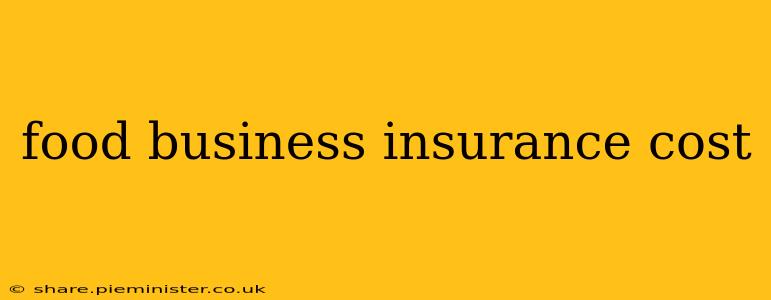Starting or running a food business is exciting, but understanding the costs involved is crucial for success. One significant expense often overlooked is insurance. The cost of food business insurance varies widely depending on several factors, and this guide will break down those factors and help you understand what to expect.
What Factors Determine the Cost of Food Business Insurance?
Several key factors influence the premium you'll pay for food business insurance:
-
Type of Food Business: A small bakery will have different insurance needs and costs than a large-scale restaurant or food truck. The complexity of your operations and the potential for liability directly impact premiums. A restaurant serving alcohol will pay more than a bakery.
-
Location: Insurance costs vary geographically. Areas with higher crime rates or a history of more significant liability claims will typically have higher premiums. Rent costs for business locations also play a role.
-
Coverage Limits: The higher the coverage limits you choose (the maximum amount the insurer will pay out for a claim), the higher your premium. This is a balancing act; you need enough coverage to protect your business, but excessively high limits can increase costs unnecessarily.
-
Claims History: Your past claims history (both personal and business) is a major factor. A history of claims will likely result in higher premiums or even difficulty securing coverage.
-
Employee Count: The more employees you have, the greater the potential for workplace accidents and related claims. This often increases your workers' compensation insurance costs, a significant part of overall food business insurance.
-
Type of Insurance: Food businesses typically need multiple types of insurance, including general liability, product liability, commercial property insurance, and workers' compensation. The cost will vary depending on the specific policies you choose.
-
Deductible: Choosing a higher deductible will lower your premium but means you’ll pay more out-of-pocket in the event of a claim.
What Types of Insurance Do Food Businesses Need?
Several types of insurance are vital for protecting a food business:
-
General Liability Insurance: This protects your business from claims of bodily injury or property damage caused by your operations. For example, a customer slipping and falling in your restaurant.
-
Product Liability Insurance: This covers claims related to injury or illness caused by consuming your food products. This is especially critical for food businesses.
-
Commercial Property Insurance: This protects your physical assets, such as your building, equipment, and inventory, from damage caused by fire, theft, or other covered perils.
-
Workers' Compensation Insurance: (Often legally required) This covers medical expenses and lost wages for employees injured on the job.
-
Business Interruption Insurance: This covers lost income if your business is temporarily shut down due to a covered event (like a fire).
-
Commercial Auto Insurance: If you use vehicles for deliveries or other business purposes, you need this coverage.
How Much Does Food Business Insurance Typically Cost?
Providing an exact cost is impossible without specific details about your business. However, you can expect to pay anywhere from $500 to several thousand dollars per year, depending on the factors mentioned above. Smaller businesses with fewer employees and limited risk may pay closer to the lower end of this range, while larger, higher-risk businesses will pay significantly more.
How Can I Get the Best Rates on Food Business Insurance?
-
Shop Around: Get quotes from multiple insurance providers to compare prices and coverage options.
-
Review Your Coverage Needs: Don't over-insure; only purchase the coverage you truly need.
-
Maintain a Good Safety Record: A strong safety record can lead to lower premiums.
-
Bundle Policies: Some insurers offer discounts for bundling multiple policies (e.g., general liability and commercial auto).
What are the common exclusions in food business insurance policies?
Many policies exclude coverage for intentional acts, damage caused by wear and tear, and losses due to acts of God that are not covered by other policies. Specific exclusions vary depending on the insurance company and the policy, so it's vital to read your policy documents carefully.
What if I have a claim?
In case of a claim, contact your insurance provider immediately and follow their instructions carefully. They will guide you through the process of reporting the incident and providing necessary documentation. Be prepared to provide accurate details and supporting evidence to support your claim.
Remember, obtaining adequate food business insurance is not just a cost; it's an investment in protecting your business's future. By understanding the factors that influence cost and carefully choosing your coverage, you can secure the protection you need without breaking the bank. Consult with an insurance professional to determine the best coverage for your specific needs.
